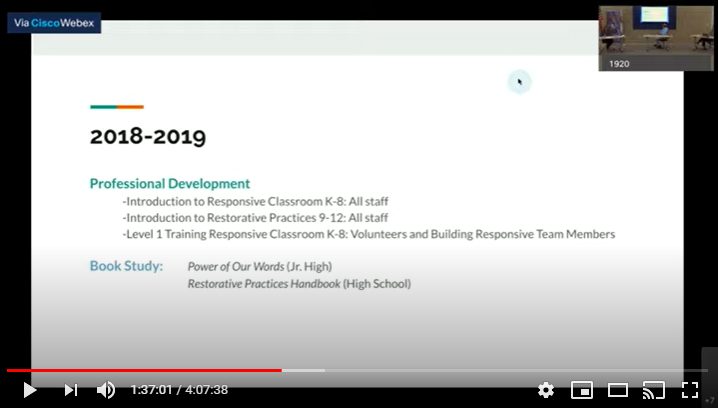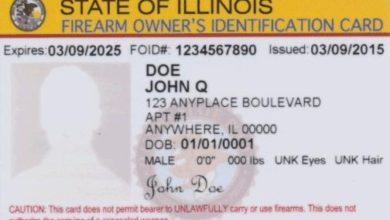Mahomet-Seymour School board gets update on previous diversity training and vision moving forward

Mahomet-Seymour’s Director of Curriculum Nicole Rummel said that the Mahomet-Seymour School District began with building relationships over the last five years as they approached diversity in the school district.
Rummel said that “it’s really been a long journey for us that began over five years ago when we started working toward creating a culture for diversity of values, and practices that support both inclusion and equity. Anytime that you’re striving for the systematic change that changes, maybe it’s slow, we’re striving to change the system for the long term, and not just mandate one or two practices, just say we checked a box.”
Beginning in 2015-18, professional development revolved around understanding trauma through reading “Paper Tigers,” “Resilience,” and “Fostering Resilient Learners.” The district’s social emotional learning efforts focused on self-awareness, self-management, social awareness, relationship skills and responsible decision-making.
According to Rummel, the Mahomet-Seymour School District began a partnership with Dr. Kevin Tan from the School of Social Work at the University of Illinois, focusing on social emotional learning.
“I really wanted an expert to support us with guidance and data as we made decisions and moved ahead with this difficult task of systematic change,” she said.
“He continues to work closely with me, high school administration and a partner to teachers at the high school, to help us meet the social emotional needs of our students.”
By 2018, the district was focused on enhancing a student’s social awareness and relationship skills.
Mahomet-Seymour used responsive classroom, student-centered, social and emotional learning approach to teaching and discipline, in grades K-8 and restorative practices, focusing on relationship-building, problem-solving and conflict resolution at the high school level.
“These are soft skills that we know are critical and helping students succeed in the workplace, and in life in general,” she said.
They also did a book study with “Power of Our Words” at Mahomet-Seymour Junior High and “Restorative Practice Handbook” at the high school level.
The 2019-20 school year was to include the Restorative Team at Mahomet-Seymour High School working on “Trained Trainers”, and a Responsive Classroom Trainer Follow-up in Jan. 2020. Elementary teachers did a book study with “Power of Our Words” while the DIRT team studied “Better Than Carrots or Sticks: Restorative Practice for Positive Classroom Management.”
The COVID-19 pandemic delayed some of the district’s efforts in diversity training, though. In April 2020 the district had an SES and Race Diversity Training planned. They also planned an LBGTQI+ Diversity Training in May 2020. According to the district plan, professional development in Nov. and Dec. will include these two topics.
They also plan to study “Culture, Class & Race: Constructive Conversations that Unite & Energize Your School & Community” while also continuing Restorative Practices/Responsive Classroom Diversity training on early release days in Feb., April and May.
A new Illinois law requires that students be presented with history lessons that include the contributions of members of lesbian, gay, bisexual, transgender and queer communities before they graduate from eighth grade. Mahomet-Seymour will develop curriculum in the social studies and English department for K-12. Diversity , inclusion and equity will also be part of that curriculum development.
A cultural Awareness Committee at Middletown Prairie will help select age-appropriate texts. The district also hopes to hold afterschool BLAST programs that focus on diversity.
Lincoln Trail will continue their one-day Hands Around the World that focuses on inviting community members into the school to share cultural traditions and information with students. The Principal Advisory group will also focus on inclusion and equity.
Mahomet-Seymour hopes to bring the community into the conversation of diversity with town halls led by Dr. Carter-Black and Dr. Tan in the fall. Those town halls were postponed from April 27, May 4 and May 6, according to Rummel. The fall dates are TBD.
Rummel said after listening to feedback from the community during the town halls, a district-wide/community-wide diversity team would be formed.
“Our hope is to go and listen,” Rummel said. “And then, after that, we will, we would talk about our goal of creating a district-wide/community-wide diversity team, and hope that some of the parents that would be willing to come to that would be interested in participating on the team.”
Rummel said that the idea would be to target populations that don’t often interact with the school district. They have looked at holding them near Candlewood and in Seymour with a light meal.
Board member Merle Giles said that he served on another board that helped at-risk teenage boys. There he learned that there are two chances to teach children right from wrong: before they are 3 and before they are 10.
“So my suggestion would be to think about budgets. Think about the attention of the 10 and under crowd,” he said.
“I’m an advocate of how many of the practices are needed to actually change, not just a curriculum. So how do we build in inspections, how do we build in feedback mechanisms to support? These are typically management things that are not necessarily a school district, but in our case, I think we’ll have to adapt in ways that aren’t natural to school districts.”
Board member Jeremy Henrichs said that he believes this type of planning should be part of the broader strategic planning the board is looking to undertake.
He said that town halls will provide “reliable and valid information.”
Henrichs also asked for the outcomes the district was trying to achieve.
“We want our history to be inclusive and for it to be a safe place,” Rummel said.
“But we can’t do that in a safe way if we don’t have the relationships there.
“It’s really asking a lot of our staff and us to be reflective of bias that we hold. We have to own that. And when you begin to own that and express it, it can be embarrassing. We have to create a safe place for staff to have this conversation.
“And so I think that, creating a place where all students are equal, feel valued is extremely important; and that they all have the same opportunities. And I think there are things that we do unintentionally, hopefully, that impede that.”
Henrichs said that he likes the focus on relationships, and helping everyone understand that they have value. He also said that he would like the district to focus on narrowing the academic achievement gap.
Rummel shared that very few low-income Mahomet-Seymour students are part of the AP courses, meaning they don’t have access to some of the higher ed opportunities.
“Like I said relationships and doing value is good but if it’s not changing people’s lives educationally…” Henrichs said. This has been done for decades, diversity training.
“I think we just need to make sure that it’s not the expedient thing for us to do.
“I want to say, to me, there needs to be a purpose. If we’re not narrowing that academic achievement gap. Then we’re not really helping them long term.
“If we aren’t narrowing that gap, we’re not changing people’s lives.”
Rummel said that there is research that shows that there is a correlation between students feeling engaged and connected to school and their academic achievement.
“If we could close the achievement gap, we would all be millionaires,” Rummel said.
“That’s what we’ve all been striving for. It’s hard, you know when kids come in at such a deficit. There’s such a gap already, it’s really hard to close.”
Superintendent Lindsey Hall said “this should just be activities and professional development that is interwoven into what the district does moving forward.
“It should be part of a strategic plan that the board puts together with goals that are set for the administration and teachers to work on. Better academics, but you also heard so much about the social emotional piece, as well. So I would just encourage the board to continue to try and move ahead with planning.”
To learn more about students’ perspectives on diversity at Mahomet-Seymour and the call to action, read this article: https://mahometdaily.com/mahomet-seymour-alumni-and-school-board-shared-thoughts-on-race-and-education/.





One Comment